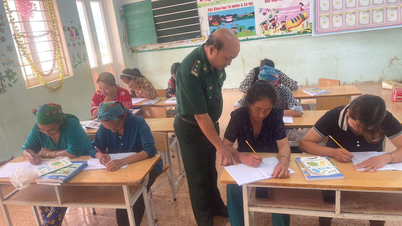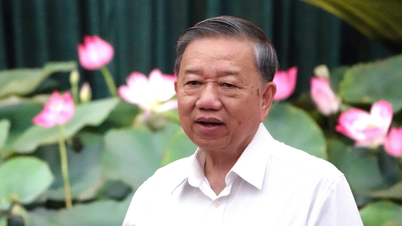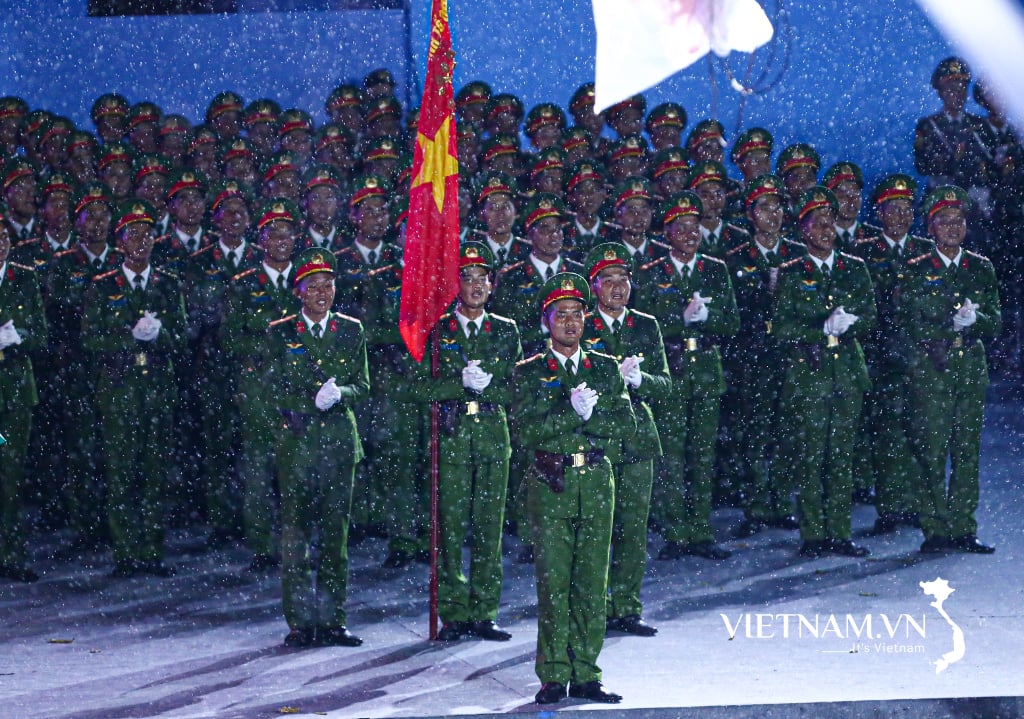
Delegate Phan Thi My Dung contributed to the draft Law on Notarization (amended) at the discussion session.
Participating in the discussion session, delegate Phan Thi My Dung - Director of the Department of Justice of Long An province stated that Article 9 of the draft Law stipulates that the training period for notary profession is 12 months, except for the subjects specified in Clause 3 of this Article, the training period is reduced by half (6 months). Compared with the provisions of the current Law, the draft Law has removed the provision that certain subjects are exempted from notary profession training, agreeing that because the notary profession is a very specific profession, notarization has ensured the stability and safety of contracts and transactions that are increasingly large in scale, occurring more frequently and more complicatedly in economic and social life, the certification of notaries for contracts and transactions, documents is of high legal value, accordingly requiring the quality of notaries (including knowledge, skills, professional ethics, etc.), must be trained.
However, after completing the notary training, the notary practice must be practiced for 12 months (stipulated in Clause 1, Article 10) and there is no provision for a reduction in the practice period. The delegate proposed that the draft law should inherit the provisions of the current Law in the following direction: For those who have a 6-month notary training period, the notary practice internship period can be shorter than those who have a 12-month notary training period, because these are people who have worked for many years, have experience in the legal field and in the past, the implementation of this content of the current Law has been stable without arising any problems or limitations.
And related to this content, Clause 5, Article 10 continues to stipulate: People who have completed their internship can register to take the notary internship test;... In case they do not meet the requirements of the test, they can continue to register to take the test. People who do not meet the requirements in 3 times of taking the test must practice again before registering to take the next test. This is a new regulation compared to the current Law. It is proposed to remove this content because it has no scientific basis or legal basis: People who fail the internship test after 3 times do not necessarily fail the 4th test, nor does it mean that after 3 failed tests, they will practice again for another year and then retake the test and pass. In fact, those who fail the test, while waiting for the next test, often continue to work at a notary organization. In addition, this regulation creates administrative procedures whose impact has not been assessed.
In Clause 5, Article 10 of the draft law stipulates: Within 05 years from the date of being granted the certificate of probationary examination results, if the person granted the certificate does not request to be appointed as a notary, the certificate will expire, and the person whose certificate has expired and wants to be appointed as a notary must re-register to attend the examination. Delegate Dung said that the 05-year period is too long (this is also a new regulation), there is no reason why after passing the probationary examination, one must wait 5 years to register to be appointed as a notary to practice, thus wasting resources, losing knowledge and the practice of enforcing the Law has not yet created any problems or inadequacies leading to the need to supplement this regulation. However, in order to facilitate some cases of force majeure that cannot practice immediately (such as medical treatment, going abroad), it is proposed that this period be a maximum of 2 years.
Regarding the temporary suspension of Notary Office operations, Clause 1, Article 30 stipulates the cases in which Notary Office operations are temporarily suspended. According to the delegate, this is a new, necessary and appropriate addition. However, comparing with Clause 4, the delegate believes that this is a general and "rigid" provision that cannot be implemented in the case of requesting a temporary suspension due to force majeure or objective obstacles. If a force majeure situation such as natural disasters, epidemics, etc. has occurred, to request a temporary suspension of operations, it is inappropriate to: Pay all taxes, pay all debts, pay all salaries, and perform the agreed contents in the contract signed with the notary and staff. At the same time, the delegate proposed to assign the Government to provide detailed regulations to concretize the regulations that are still very general, to resolve possible problems such as: Notary practice organizations receive the handover documents but refuse to request amendments or supplements to the documents that the notary office that is being temporarily suspended has notarized (because this is the right of the notary) or they damage or lose the notarized documents that have been handed over and the responsibilities in these cases also need to be clearly defined.
Regarding the regulations on employees of notary organizations: Delegates believe that the regulations between the current Law and this draft Law do not have specific regulations for this position, the draft Law mentions this person in Article 37. Thus, the scope of the role and position of this employee in notary activities also needs to be clarified. In fact, notary assistants participate in most stages of the notary process: From receiving documents, consulting on documents, drafting documents, searching the notary database, supporting the signing of transactions, supporting scheduling, arranging for notaries to sign notarizations, updating data, creating archives and many other tasks. It is necessary to add a provision on the rights, obligations and responsibilities of this subject in the Law to create a legal basis for them to assist notaries in accessing and handling notary-related work, including the principle of confidentiality of notary information, as well as the qualifications of this subject when communicating with organizations and individuals related to notary activities. Notary laws of many countries stipulate this title. Through research, in the criteria for establishing notary offices issued by the provincial People's Committee, there are scoring criteria for this assistant title (such as if they have a bachelor's degree in law or higher, have seniority in legal work, the points will be added higher). Having a policy for notary assistants in considering the conditions for appointing notaries, this is a source of high-quality notaries because they are subjects with regular professional activities and are closest to notaries, with a distinct advantage in terms of expertise and experience.
In addition, regarding the regulations on archiving notarized records, delegates said that this is the final step of the notarization process and has an important role and significance in storing information to serve the activities of notarization organizations, inspection and examination work of state management agencies. In some cases, notarized records are also important documents and evidence to serve the investigation, prosecution and trial work. In particular, for notarized assets such as land use rights, home ownership rights, and valuable assets, notarized records need to be carefully preserved and stored for a long time, so the storage time of records needs to be regulated based on scientific grounds, the statute of limitations for filing a lawsuit, the characteristics of the documents as well as the requirements for inspection, examination and provision of evidence as mentioned above. According to the provisions of Clause 2, Article 65, “The original notarized document and other documents in the notarized file must be kept at the headquarters of the notary practice organization for at least 20 years for transactions involving real estate, and at least 10 years for other types of transactions.... Notarized files are stored in the centralized notarized database for at least 30 years from the date the notarized document takes effect.”
From there, the delegate suggested that it is necessary to explain why the time frames are 10 years, 20 years or 30 years. In addition, the draft has not yet stipulated the process of responsibility for handling records when the storage period has expired. In case the records are converted from paper to electronic, is it necessary to keep the paper copies or digitize the records that have been stored for many years? If so, how long should they be stored? What is the value of electronic archives? Currently, many notary offices have stored notarized records related to real estate for over 30 years but really do not dare to handle them even though the storage period has expired according to the law and there are no specific regulations to guide how to handle these records. The delegate suggested that it is necessary to review, evaluate and fully regulate this issue in the draft Law.

Vice Chairman of the National Assembly - Nguyen Khac Dinh concluded the discussion session in the hall on the draft Law on Notarization (amended).
Concluding the discussion, Vice Chairman of the National Assembly - Nguyen Khac Dinh said that the majority of opinions of National Assembly deputies showed high consensus on the need to comprehensively amend the Notary Law and contributed many specific, frank, enthusiastic, practical opinions, and proposed many amendment options. The National Assembly Standing Committee will direct the Secretary General of the National Assembly, the agency in charge of the review and the agency in charge of the drafting, and relevant agencies to urgently study, absorb, and explain the opinions of National Assembly deputies to complete the draft Law; organize conferences, seminars, and discussions to collect expert opinions to exchange and clarify specific discussion contents, especially issues that many National Assembly deputies expressed their opinions about. On that basis, complete the draft law and the Report on absorption and explanation to submit to the Conference of specialized National Assembly deputies; Then continue to complete the draft and send it to the National Assembly Delegations, National Assembly deputies, relevant agencies and organizations for comments before completing it to submit to the National Assembly for consideration at the 8th Session in October 2024./.
Kien Quoc
Source: https://baolongan.vn/dai-bieu-phan-thi-my-dung-giam-doc-so-tu-phap-tinh-long-an-de-nghi-bo-sung-quy-dinh-dieu-chinh-ve-tro-ly-cong-chung-vien-a178235.html





























































































Comment (0)